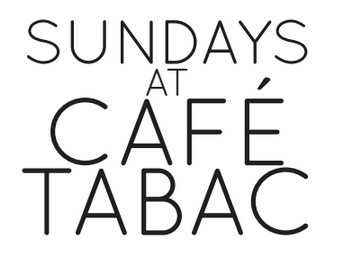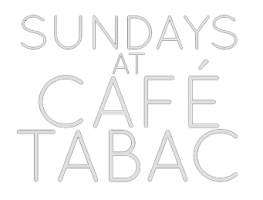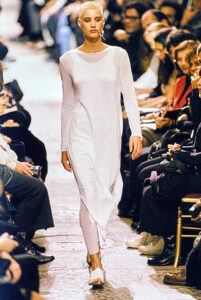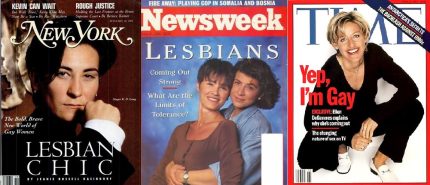Step into the electrifying realm of radical glamour, where Sundays at Café Tabac immortalizes the iconic lesbian night that lit up New York’s East Village from 1993 to 1995. A vibrant celebration of diversity and unapologetic self-expression, this unforgettable gathering not only transformed lives but also mirrored the surge of visibility that sent shockwaves through mainstream media—during a time when being seen was a matter of survival.
ABOUT THE FILM
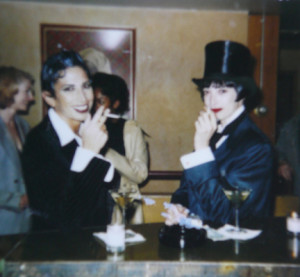
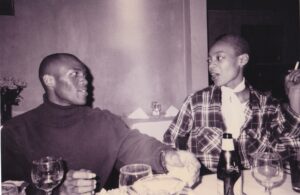 It’s Sunday night, 1993, and we’re at Café Tabac—an intimate French bistro in New York’s East Village. The hum of conversation mingles with the soulful mixes of DJ Sharee Nash. The party starts early at dinner, a slow burn of clinking glasses and flirtatious glances, until the room fills up with a diverse cross-section of New York’s lesbian community. They include artists, fashionistas, activists, (the newly coined) “celesbians” and their preferred friends and family. The party’s hosts, Wanda Acosta and Sharee Nash, Nuyorican-Latina and African American respectively, inspire a distinctive energy to the night, where women of color felt especially celebrated and represented. The air is thick with cigarette smoke, laughter and possibility as the night erupts into something electric. The collective boldness of the women is so unfamiliar yet entirely infectious, that the room buzzes. It inspires, affirms and imprints an unshakeable new way of being. Word of the party travels around the world and lesbians begin to make their way there from afar. It changes lives, and those women go on to change the world. This isn’t just a party—it’s a sanctuary and an incubator.
It’s Sunday night, 1993, and we’re at Café Tabac—an intimate French bistro in New York’s East Village. The hum of conversation mingles with the soulful mixes of DJ Sharee Nash. The party starts early at dinner, a slow burn of clinking glasses and flirtatious glances, until the room fills up with a diverse cross-section of New York’s lesbian community. They include artists, fashionistas, activists, (the newly coined) “celesbians” and their preferred friends and family. The party’s hosts, Wanda Acosta and Sharee Nash, Nuyorican-Latina and African American respectively, inspire a distinctive energy to the night, where women of color felt especially celebrated and represented. The air is thick with cigarette smoke, laughter and possibility as the night erupts into something electric. The collective boldness of the women is so unfamiliar yet entirely infectious, that the room buzzes. It inspires, affirms and imprints an unshakeable new way of being. Word of the party travels around the world and lesbians begin to make their way there from afar. It changes lives, and those women go on to change the world. This isn’t just a party—it’s a sanctuary and an incubator.
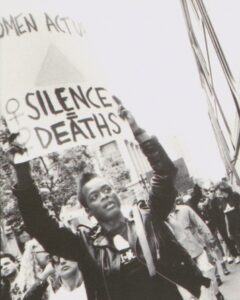 “Sundays at Café Tabac” takes us on an unforgettable journey into the heart of this fleeting yet pivotal moment in time, when this weekly gathering—during a thriving era of lesbian nightlife—became a cultural touchstone. From 1993 to 1995, this legendary lesbian night filled with head-turning fashion wasn’t just a place to see and be seen—it was a vibrant, radical act of self-definition. When visibility was a matter of life and death for our community, Café Tabac provided a defiant stage for those refusing to be erased, its impact resonating far beyond the walls of this party.
“Sundays at Café Tabac” takes us on an unforgettable journey into the heart of this fleeting yet pivotal moment in time, when this weekly gathering—during a thriving era of lesbian nightlife—became a cultural touchstone. From 1993 to 1995, this legendary lesbian night filled with head-turning fashion wasn’t just a place to see and be seen—it was a vibrant, radical act of self-definition. When visibility was a matter of life and death for our community, Café Tabac provided a defiant stage for those refusing to be erased, its impact resonating far beyond the walls of this party.
Through over 60+ personal narratives of the LGBTQ+ patrons, hosts, and icons who found both refuge and revelation here (which include filmmaker/activists Maria Maggenti, Rose Troche, Guinevere Turner, Catherine Gund; models Jenny Shimizu, Eve Salvail, Patricia Velazquez; writers Jacqueline Woodson, Sarah Schulman, Linda Villarosa, Hilton Als, Michael Musto; performers Lea Delaria, Marga Gomez; musicians Meshell Ndegeocello, the band BETTY; downtown & fashion icons Patricia Field, Edwige; and so many more)—the film weaves a story of nightlife, activism, and the unprecedented surge of lesbian media representation in the early ’90s. Against the backdrop of the AIDS crisis and political battles over LGBTQ+ and women’s rights, the film is more than just about a party. It presents a front row seat to early ‘90s culture and history and shines a light on the vital yet overlooked contributions of lesbians—many among Café Tabac’s community— to these movements through organizing prowess, vision, creativity, boldness, defiance and sheer brilliance. Their impact still echoes today, despite the history books failing to acknowledge their role.
Directed and Produced by Karen Song, a Café Tabac alum, and Produced by the party’s co-host Wanda Acosta, the film blends intimate interviews with evocative fashion-forward recreations styled by Rebecca Weinberg—Emmy-winner for “Sex & The City” (with Patricia Field), animation by multi-Emmy winner Lauren Fisher, never-before-seen archives, and an original score by multi–Grammy-winning musician Meshell Ndegeocello. Edited altogether by award-winning filmmaker Rhys Ernst, the documentary pulses with the energy of an era when nightlife, activism and for the first time ever, lesbians omnipresent on mainstream magazine covers, primetime TV and the like—were inseparable.
“The way that the gathering changed the world is, it gave us a strength I think we didn’t know we had. That we didn’t know we were building on by being in a space where there were mirrors for us.”
Jacqueline Woodson
- SACT Interview
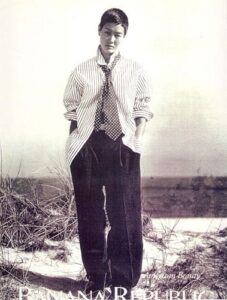
Sunday nights at Café Tabac intrinsically is the story of VISIBILITY. Once we were able to see ourselves unapologetically be our full selves, celebrating and being celebrated by each other, it fostered a profound personal empowerment—grounded in the power of community— that each person carried out into the world. The radical glamour on display, is also a reflection of how our creative impulses can signal a challenge to the status quo, of not just survival, but a defiant and poetic celebration and expansion of one’s identity and community. “Sundays at Café Tabac” uncovers the idea that nightlife is visibility as a practice, a necessary in-person practice. And its impact can last decades after that “last call” on the night the party ended in 1995.
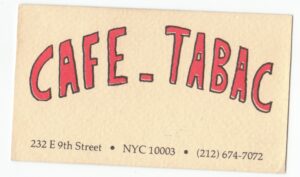
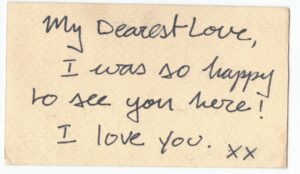
“We hugged each other. We kissed, we made eye contact. We had conversations of being in a room where you could smell each other and talk to each other and see each other across the room and know we are here.”
Deana Becker
- SACT Interview
With the unfathomable overturning of Roe v. Wade, “Don’t Say Gay” legislation passed as LAW in Florida, school book bans and LGBTQ language, government institutions & programs, archives and libraries being disintegrated before our very eyes—where our bodies, history, rights and visibility are undeniably under attack—we can see how progress can suddenly be erased… how we can be disappeared. It is clear how important visibility is as a regular practice that we need to keep fighting for, in physical, media and virtual landscapes. It is not just a given. Visibility is just one of the many battlegrounds where we we have to fight for our right to exist and for our truths, because those who control the narrative—as we witnessed in the ’80s during the AIDS epidemic—have the power to distort who we are and ultimately cause us grave harm.
As forces seek to disappear and silence our community once again, “Sundays at Café Tabac” is more than a reflection on the past—it’s a reminder of our collective strength, caring, legacy, and the spaces and world we continue to create for ourselves. Queer folks have always found a way, and part of that pathway is paved with the radical need to celebrate ourselves and our lives—together. Nightlife has long been a cornerstone of queer history and activism. The “Sundays at Café Tabac” documentary springs from this rich historical legacy. This is our history. And it’s time to bring it into the light.
JOIN US! support LGBTQ visibility through this film about visibility itself.
YOU CAN HELP MAKE THIS FILM A REALITY.
MAKE A TAX DEDUCTIBLE DONATION TODAY!
![]()
“Sundays at Café Tabac” is a Women Make Movies Production Assistance Program Project.
Established in 1972, Women Make Movies is a 501(c)(3) non-profit media arts organization registered with the New York Charities Bureau of New York State. As the fiscal sponsor, WMM accepts donations or grants on behalf of the filmmaker and takes the responsibility of administering the funds received in support of the development and completion of the film.
